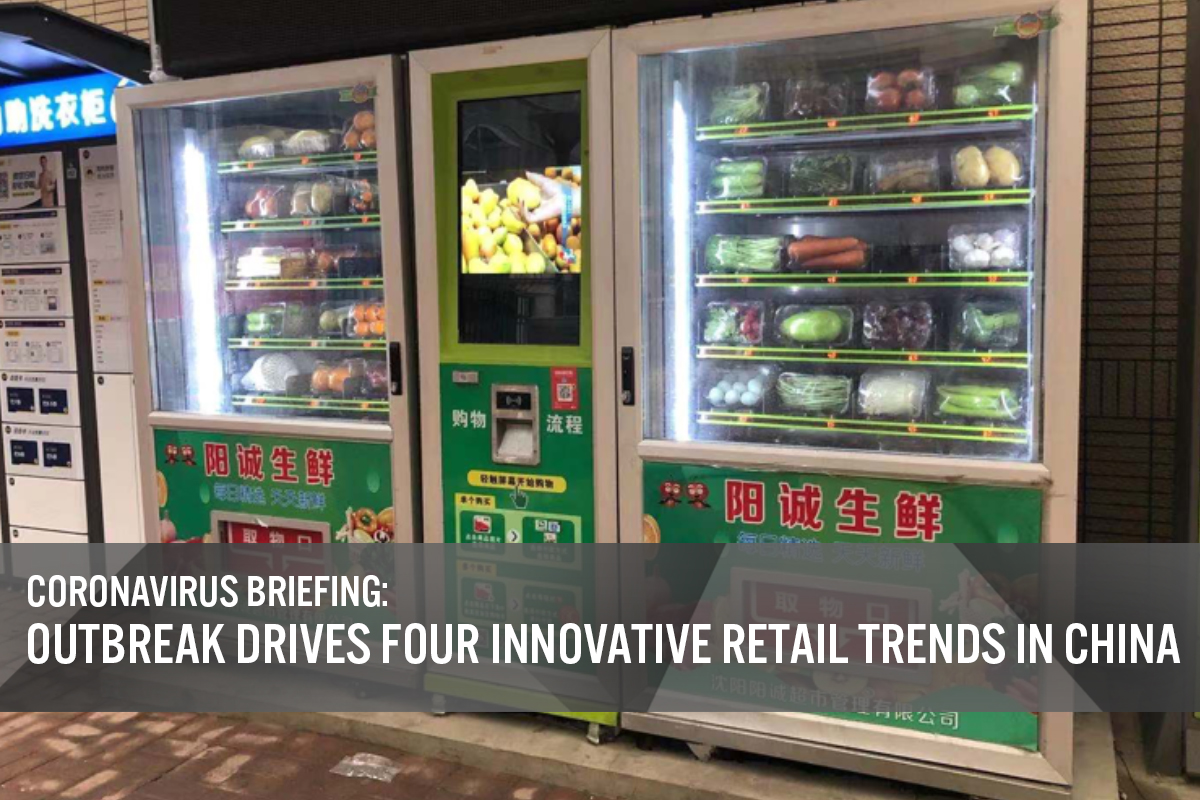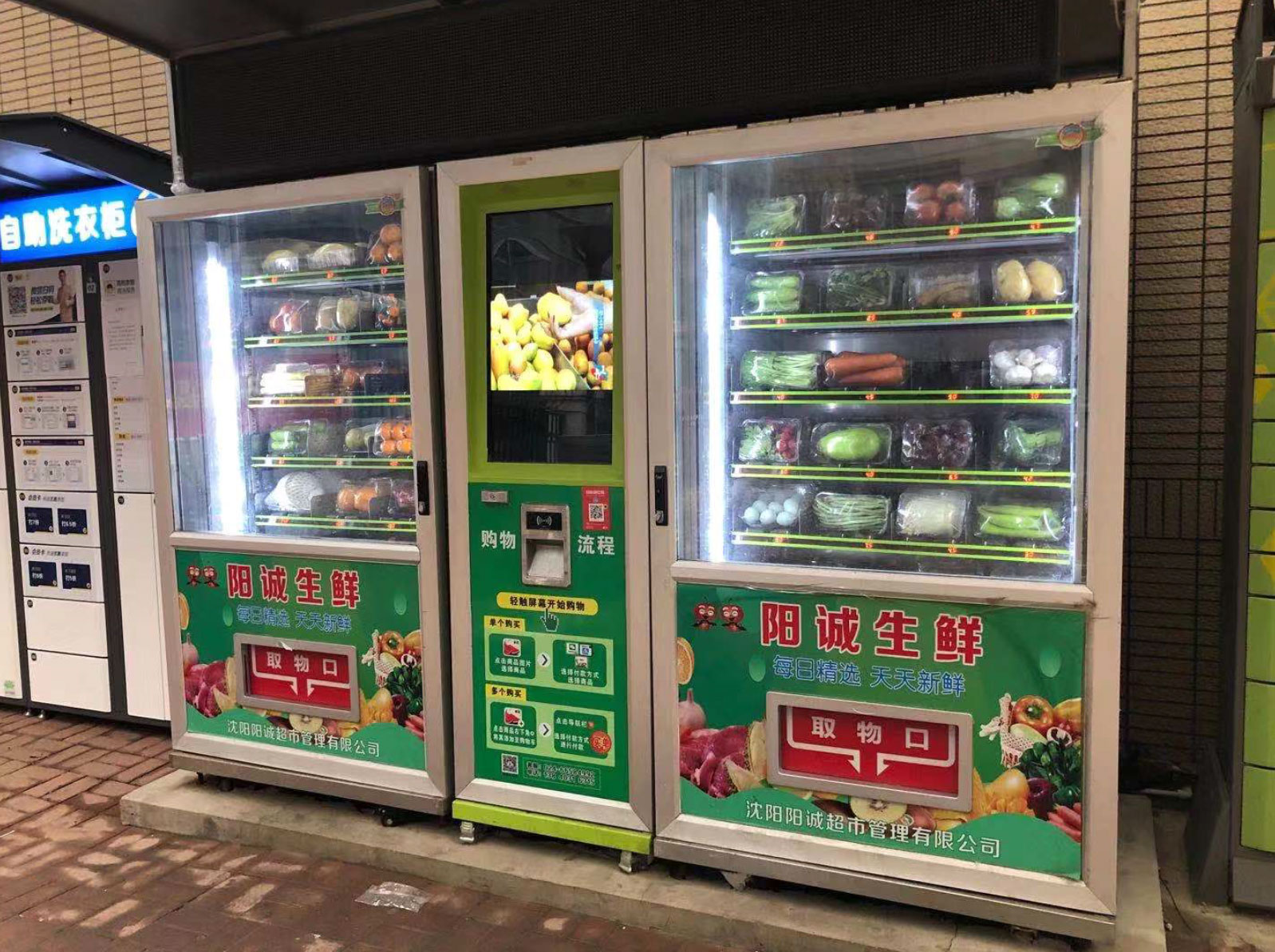
DIpil Das
In our Coronavirus Briefing series, we outline the possible impacts of the coronavirus outbreak on economies, sectors and businesses. In this report, we look at how the outbreak—and particularly the shutdown of much regular trade—is fueling four innovative trends in retail and food service in China.
As the coronavirus outbreak shows no signs of slowing down, the Chinese government has advised people to avoid public places to prevent the virus from spreading. Although the official back-to-work day was on February 10, many companies have advised their employees to work from home until February 17. Such restrictions do not completely stop people from shopping, but consumers seeking to avoid crowded areas or those who are quarantined have been turning to novel ways of shopping.
Vending Machines Are Proving More Popular for Fresh Produce
Fresh-produce vending machines have been popping up in many communities in China since 2018. The products on offer are generally more expensive than from corner stores and supermarkets, so vending machines were primarily an appealing option due to stock limitations elsewhere, rather than any price advantage: Since most fresh vegetables are sold out by the end of the day at supermarkets, young people that finish work late generally do not mind paying more to get fresh vegetables from vending machines.
Since the outbreak of the coronavirus, demand for fresh produce has surged. Although consumers can get still purchase vegetables from supermarkets, they have to be there early in the morning to ensure stock is available; if they want to buy fresh produce online, shoppers must reserve their delivery time slots one day in advance. Vending machines have therefore increased in popularity with more diverse shopper demographics, as they offer an additional source of fresh vegetables.
[caption id="attachment_103704" align="aligncenter" width="700"] Fresh-produce vending machine in a community area in China
Fresh-produce vending machine in a community area in China
Source: Coresight Research [/caption] Community Centers Are Being Used as Logistics Centers The Chinese government has issued special orders in cities such as Fuzhou, Hangzhou and Wenzhou, under which only one person from each household is allowed to go out every two days to buy necessities. At the same time, many residential compounds and buildings are no longer allowing delivery drivers to enter. As a result, community centers in those cities have become mini logistics centers. People can shop online and have their products delivered to community centers. Designated volunteers from each community then deliver the products from a community center to the consumer’s front door. Drones and Robots Are Fulfilling Last-Mile Deliveries Because many residential compounds and buildings have banned delivery drivers from entering, the shopping experience is being degraded (although delivery drivers can typically still leave parcels in reception areas). To combat this, retailers have started to use delivery robots and drones to get products to consumers directly. Companies have been testing this technology since 2018. Leveraging big data and artificial intelligence, Chinese conglomerate Suning launched delivery robots in selected communities to fulfill last-mile delivery. The robots, which are first disinfected, follow pre-set routes to deliver parcels to consumers, navigating elevators and avoiding obstacles. Diamond Princess, a cruise ship that belongs to cruise operator Princess Cruises, imposed a 14-day quarantine for all of its 3,500 guests and crew after several guests were diagnosed with coronavirus. Guests have to stay in their cabins and have their meals delivered to their doors by the crew in order to minimize direct contact with other people. One Australian couple on the ship—which is floating off the coast off Tokyo—turned to Naked Wines to order additional beverages, and the Australian wine company deployed a drone to deliver wine straight to Jan and Dave Binskin on the ship. Shared Staff between Supermarket Operators and Food-Service, Entertainment Operators Elsewhere in our Coronavirus Briefing series, we discussed how one restaurant chain teamed up with Alibaba’s Freshippo supermarket for the latter to take on surplus staff. With the restaurant and entertainment sectors having had their operations suspended, more supermarket operators—including Carrefour, Suning and Walmart—have since taken similar actions to bring in those people left without work. According to Carrefour, more than 2,500 people that previously held roles in restaurants or entertainment have applied to work for the supermarket chain temporarily. At the same time, Suning has hired more than 30,000 staff since the coronavirus outbreak.
 Fresh-produce vending machine in a community area in China
Fresh-produce vending machine in a community area in China Source: Coresight Research [/caption] Community Centers Are Being Used as Logistics Centers The Chinese government has issued special orders in cities such as Fuzhou, Hangzhou and Wenzhou, under which only one person from each household is allowed to go out every two days to buy necessities. At the same time, many residential compounds and buildings are no longer allowing delivery drivers to enter. As a result, community centers in those cities have become mini logistics centers. People can shop online and have their products delivered to community centers. Designated volunteers from each community then deliver the products from a community center to the consumer’s front door. Drones and Robots Are Fulfilling Last-Mile Deliveries Because many residential compounds and buildings have banned delivery drivers from entering, the shopping experience is being degraded (although delivery drivers can typically still leave parcels in reception areas). To combat this, retailers have started to use delivery robots and drones to get products to consumers directly. Companies have been testing this technology since 2018. Leveraging big data and artificial intelligence, Chinese conglomerate Suning launched delivery robots in selected communities to fulfill last-mile delivery. The robots, which are first disinfected, follow pre-set routes to deliver parcels to consumers, navigating elevators and avoiding obstacles. Diamond Princess, a cruise ship that belongs to cruise operator Princess Cruises, imposed a 14-day quarantine for all of its 3,500 guests and crew after several guests were diagnosed with coronavirus. Guests have to stay in their cabins and have their meals delivered to their doors by the crew in order to minimize direct contact with other people. One Australian couple on the ship—which is floating off the coast off Tokyo—turned to Naked Wines to order additional beverages, and the Australian wine company deployed a drone to deliver wine straight to Jan and Dave Binskin on the ship. Shared Staff between Supermarket Operators and Food-Service, Entertainment Operators Elsewhere in our Coronavirus Briefing series, we discussed how one restaurant chain teamed up with Alibaba’s Freshippo supermarket for the latter to take on surplus staff. With the restaurant and entertainment sectors having had their operations suspended, more supermarket operators—including Carrefour, Suning and Walmart—have since taken similar actions to bring in those people left without work. According to Carrefour, more than 2,500 people that previously held roles in restaurants or entertainment have applied to work for the supermarket chain temporarily. At the same time, Suning has hired more than 30,000 staff since the coronavirus outbreak.